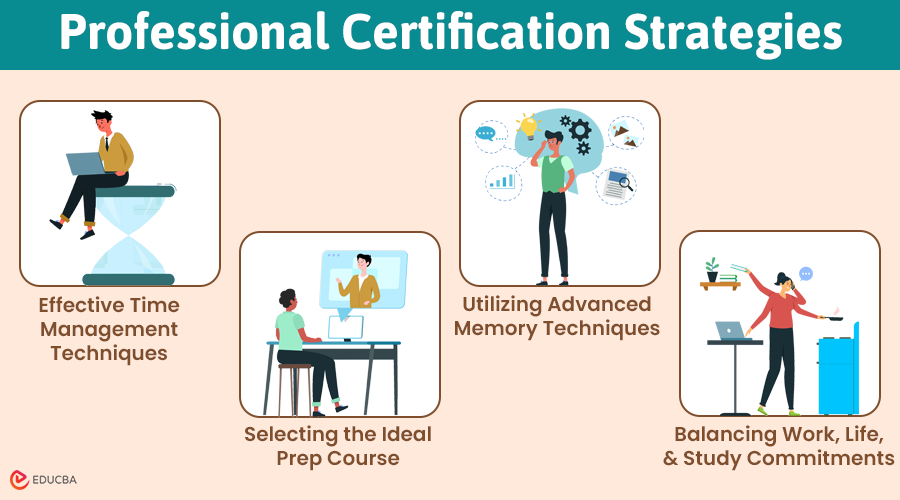
Why are Professional Certification Strategies Important?
As professional certifications are a powerful way to differentiate yourself, enhance your expertise, and advance your career, professional certification strategies are equally important. Whether aiming to enter a new field, climb the corporate ladder, or validate your skills, strategic planning and execution of professional certifications can significantly impact you.
Top 4 Key Professional Certification Strategies
Here are key professional certification strategies:
#1. Effective Time Management Techniques
Time is your most valuable asset when preparing for professional certifications. Mastering time management can set you apart. Here is how to do it:
- Create a Study Schedule: Divide the syllabus into smaller sections and assign specific times to study each one.
- Set SMART Goals: Set SMART (Specific, Measurable, Achievable, Relevant, and Time-bound) goals to keep you focused.
- Use Time-Blocking: Dedicate blocks of uninterrupted time to studying; treat these as non-negotiable appointments.
- Prioritize Tasks: Tackle harder subjects or areas you are less confident in first while your mind is fresh.
- Leverage Technology Tools: Apps like Trello and Asana help easily organize tasks and monitor progress.
- Practice the Pomodoro Technique: Work in 25-minute bursts with 5-minute breaks to maintain concentration without burnout.
- Limit Distractions: Find a quiet study space and mute notifications on your devices to maximize focus.
- Regularly Review Progress: Weekly check-ins let you adjust strategies if needed. It helps minimize stress, which can be 15% higher on test days, by being proactive.
#2. Selecting the Ideal Prep Course
Choosing the right prep course can make a major difference in whether you sail through the certification process or struggle. Here is how to pick one that aligns with your needs:
- Assess Your Learning Style: Are you a visual learner or prefer hands-on practice? Select a course that caters to your strengths.
- Research Reputable Providers: Look for courses backed by high pass rates and positive reviews from previous students.
- Evaluate Content Quality: Ensure the material covers all exam topics comprehensively, focusing on current trends and updates.
- Consider Flexibility: Opt for online options to fit studying around work or personal commitments. So, for instance, if you want to qualify as a lawyer, look for a bar prep course that fits you and your schedule.
- Check Instructor Credentials: Experienced instructors with industry expertise can offer invaluable insights and tips.
- Utilize Trial Periods or Demos: Many providers offer free trials, so use these to gauge if the teaching style suits you before committing.
- Analyze Support Resources: Courses offering additional support like Q&A sessions, tutoring, or forums are highly beneficial.
- Compare Costs Versus Value: Higher cost does not always mean better quality, so balance affordability with content richness.
#3. Utilizing Advanced Memory Techniques
Retention is key when preparing for a certification exam. Here are some advanced memory techniques to help you retain information:
- Spaced Repetition: Review information at increasing intervals to reinforce long-term retention.
- Mnemonics: Use acronyms, rhymes, or songs to make complex concepts easier to remember.
- Mind Mapping: Visualize connections between ideas using diagrams to organize and integrate knowledge effectively.
- Chunking: Divide large pieces of information into smaller parts or groups, similar to remembering a phone number in segments.
- Visualization: Create clear mental pictures related to the material to improve memory. Use techniques like the memory palace to store concepts and figures.
- Active Recall Testing: Quiz yourself regularly without first looking at notes to retrieve information from memory actively.
- Storytelling Technique: Weave facts into a narrative or story form to make details more engaging and memorable.
- Teach What You Learn: Explaining topics to someone else reinforces what you have learned and highlights areas needing review. Our brains can store up to 1 million gigabytes of information, but repetition helps ensure your study efforts do not go to waste.
#4. Balancing Work, Life, and Study Commitments
Juggling work, personal life, and study commitments requires strategic planning. Here is how to maintain harmony while preparing for your certification:
- Set Clear Boundaries: Designate specific times for studying and inform family or housemates to minimize interruptions.
- Create a Realistic Schedule: Allocate time slots for work tasks, personal activities, and study sessions without over-committing.
- Utilize Breaks Wisely: Use short breaks at work to review flashcards or listen to relevant podcasts.
- Practice Self-Care: Aim for adequate sleep, regular exercise, and balanced meals. Your brain performs best when you are physically healthy. Aim for at least 150 minutes of exercise each week, and you will likely see a noticeable improvement in your certification test results.
- Delegate Tasks When Possible: Offload minor chores or duties at home or work, focusing on essential responsibilities only.
- Combine Activities: Integrate study with daily routines, like reviewing notes during your commute using audio resources. Since the average commute lasts between 15 and 29 minutes, using this time effectively can be very beneficial.
- Stay Flexible Yet Firm: Be adaptable if plans change, but remain firm about dedicating minimum hours per week to studying.
- Reflect Regularly: Assess your progress weekly and adjust your strategy if any aspect feels overwhelming.
Final Thoughts
Earning your next professional certification can be challenging, but these strategies can help you overcome the obstacles. You will reach your destination successfully by combining intelligent time management, expert support via prep courses, mastery of memory techniques, and balancing your commitments.
Recommended Articles
We hope you found this article on professional certification strategies helpful. Check out these recommended reads for more tips on advancing your career and mastering certification exams.

